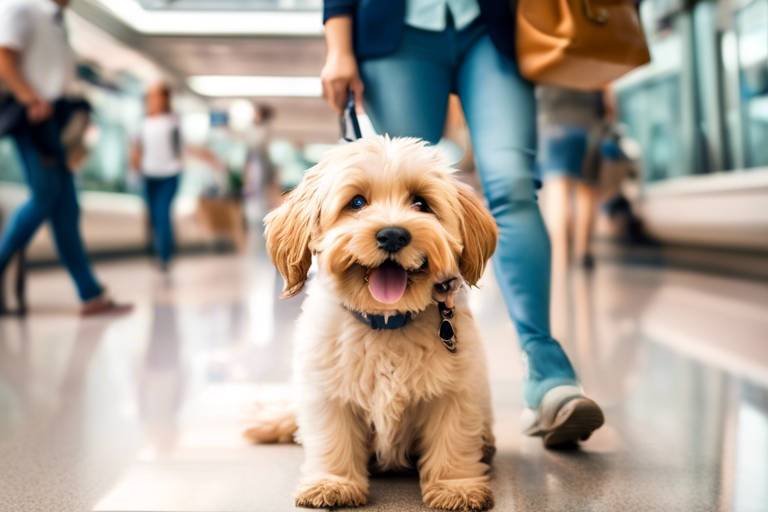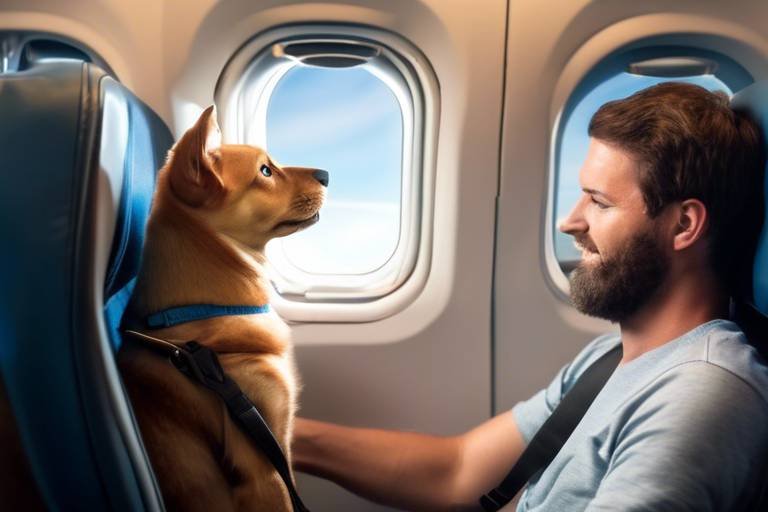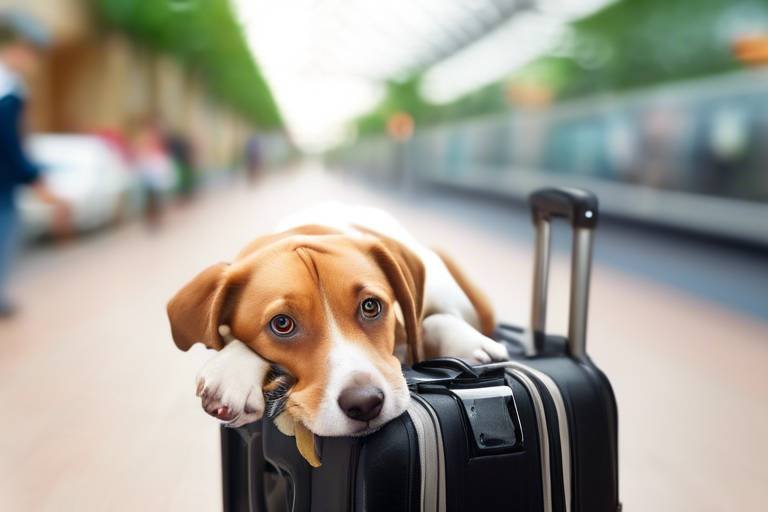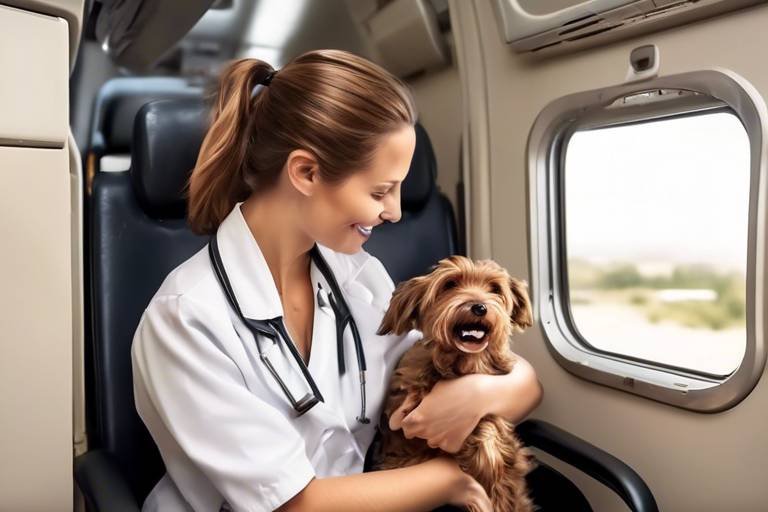How to Handle Pet Allergies During Travel
Traveling with pets can be an exhilarating experience, but it can also present challenges, especially if you or someone in your party suffers from pet allergies. These allergies can be triggered by various factors, including dander, saliva, and urine from our furry friends. The good news is that with a little preparation and awareness, you can enjoy your travels without the nagging discomfort of allergy symptoms. In this article, we’ll delve into effective strategies for managing pet allergies while ensuring a fun and memorable journey for both you and your companions.
Before we dive into the nitty-gritty of travel preparations, it’s essential to understand what pet allergies are and how they can affect different individuals. Pet allergies are caused by proteins found in the skin cells, urine, and saliva of animals, and they can lead to a variety of symptoms. These symptoms can range from sneezing and itchy eyes to more severe reactions like asthma attacks. Recognizing these symptoms early is crucial for effective management, especially when you're on the move. Think of it like being a detective; the sooner you identify the culprit (the allergen), the quicker you can take action to mitigate its effects.
Preparation is key when it comes to managing allergies during travel. One of the first steps you should take is to consult with your doctor. Discuss your allergies and ask about any specific precautions you should take while traveling. Your healthcare provider can offer tailored advice and may even prescribe medications that can help keep your symptoms at bay.
Visiting a healthcare professional before your trip can make a world of difference. They can provide insights into how to manage your allergies effectively, ensuring you’re well-prepared for the journey ahead. Don't forget to mention your travel plans; this information can help them give you the best possible advice.
Consider undergoing allergy testing if you haven't already. This can help pinpoint specific triggers, allowing you to prepare more effectively. Knowing exactly what allergens to avoid can be a game changer, especially when you’re traveling to new environments where you might encounter different pets.
There are various over-the-counter and prescription medications available that can help alleviate allergy symptoms. Antihistamines, nasal sprays, and even eye drops can be lifesavers during your travels. Make sure to pack these medications in an easily accessible spot, so you can grab them at a moment's notice. Think of them as your travel companions, always ready to step in when things get tough!
When selecting where to stay, look for pet-friendly accommodations that prioritize cleanliness and have hypoallergenic rooms. Many hotels now offer rooms specifically designed to minimize allergens, including thorough cleaning protocols. Researching your options ahead of time can save you a lot of discomfort later. It's like choosing a safe harbor in a storm; the right place can make all the difference.
Now that you’ve got your travel plans in place, it’s time to think about what to pack. Here are a few essentials that can help you manage your allergies:
- Air purifiers: Portable air purifiers can significantly reduce airborne allergens in your hotel room.
- Allergy-proof bedding: Consider packing hypoallergenic pillow and mattress covers.
- Medications: Ensure you have enough allergy medications for the duration of your trip.
When it comes to traveling with medications, it’s crucial to keep them in their original packaging, clearly labeled with your name and dosage instructions. Store them in a cool, dry place, and consider bringing a small cooler if necessary. This way, you can ensure they remain effective throughout your journey.
Don’t forget to pack personal care items that can help reduce allergy symptoms. Wipes and hand sanitizers can come in handy for quickly cleaning surfaces, while specific skincare products can help soothe irritated skin. Think of these items as your personal frontline defense against allergens.
While you’re on the road, managing pet allergies effectively is crucial. Regular cleaning routines and keeping your environment allergen-free can go a long way in ensuring your comfort. If you’re staying in a hotel, request extra cleaning or bring your own cleaning supplies to wipe down surfaces.
Keeping your travel environment clean is essential. Regularly vacuuming and dusting surfaces can help minimize allergens. If you're staying in a rental or a pet-friendly hotel, consider using protective covers for furniture and bedding to create a barrier against allergens.
Being aware of your body’s signals is critical. If you start to experience symptoms like sneezing, itching, or difficulty breathing, take action immediately. This could mean using your medications or even stepping outside for some fresh air. Think of it as tuning into your body’s internal alarm system; the sooner you respond, the better you’ll feel.
Once you return home, it’s important to clean your belongings thoroughly. This includes washing your clothes and cleaning your luggage to remove any allergens you may have picked up during your travels. It’s like giving your home a fresh start after a long journey.
Take time to decontaminate your luggage and belongings. A thorough cleaning can help ensure that you don’t bring any unwanted allergens back into your home environment.
Lastly, schedule a follow-up appointment with your healthcare provider to discuss any lingering allergy symptoms you may have experienced during your trip. This can help you adjust your management plan for future travels, making your next adventure even more enjoyable.
Q: What are the common symptoms of pet allergies?
A: Common symptoms include sneezing, runny or stuffy nose, itchy eyes, and skin rashes.
Q: Can I travel with my pet if I have allergies?
A: Yes, but it requires careful planning. Consider your allergies and consult with your doctor before bringing your pet along.
Q: What should I do if I experience an allergic reaction while traveling?
A: Use your allergy medications immediately, and if symptoms worsen, seek medical attention.
Q: Are there hypoallergenic pets?
A: While no pet is completely hypoallergenic, some breeds are known to produce fewer allergens, such as Poodles and Bichon Frises.

Understanding Pet Allergies
Pet allergies are a common issue for many individuals, often causing discomfort and distress during travel. But what exactly are pet allergies? They occur when the immune system reacts to proteins found in a pet's skin cells, urine, or saliva. These proteins, known as allergens, can trigger a range of symptoms in sensitive individuals. It's essential to understand the causes and symptoms of these allergies to manage them effectively, especially when you're on the go.
Allergens can affect individuals differently, with some experiencing mild reactions while others may suffer from severe symptoms. Common symptoms of pet allergies include:
- Itchy eyes and nose
- Runny or stuffy nose
- Sneezing
- Coughing or wheezing
- Skin rashes or hives
Recognizing these symptoms is crucial for effective management. It’s like being on a roller coaster; if you know when to brace yourself for the dips and turns, you can enjoy the ride a lot more. Knowing your triggers and how your body reacts can help you prepare for travel situations where you might encounter allergens.
Moreover, understanding the importance of recognizing these reactions cannot be overstated. For instance, if you find that your symptoms worsen in certain environments, it’s vital to take note of that. This awareness allows you to make informed decisions about your travel plans, such as choosing accommodations that minimize exposure to pet allergens. By being proactive, you can ensure a more comfortable experience for both you and your furry companions.
In summary, understanding pet allergies involves recognizing the specific allergens that trigger your symptoms and being aware of how these reactions can impact your journey. With this knowledge, you can take the necessary steps to manage your allergies effectively, ensuring that your travels remain enjoyable and stress-free.
Q: Can pet allergies develop suddenly?
A: Yes, pet allergies can develop at any age, even if you have been around pets without issues before. Changes in your immune system can trigger new allergies.
Q: Are there hypoallergenic pets?
A: While no pet is completely hypoallergenic, some breeds are known to produce fewer allergens. Breeds like Poodles and Bichon Frises are often recommended for allergy sufferers.
Q: What should I do if I have an allergic reaction while traveling?
A: If you experience an allergic reaction, take your allergy medication as prescribed, and try to remove yourself from the allergen source. If symptoms persist, seek medical attention.

Preparation Before Traveling
Before you embark on your journey, preparation is key to ensure a smooth experience for both you and your furry companions. The first step is to consult with a doctor. This conversation can provide invaluable insights tailored to your specific allergies. Your healthcare provider can recommend the best course of action, whether it’s adjusting your current medication or prescribing something new to help manage your symptoms. It’s like packing a safety net for your health, giving you peace of mind as you travel.
Another critical aspect of preparation is researching pet-friendly accommodations. Not all places are created equal when it comes to managing allergens. Look for hotels that offer hypoallergenic rooms, which are designed to minimize exposure to pet dander and other allergens. You may want to inquire about their cleaning protocols as well; some hotels may use special cleaning products that are effective in reducing allergens. This way, you can rest easy knowing that your space is as clean as possible.
When you consult with a healthcare professional, be sure to discuss your travel plans in detail. This includes the destinations you plan to visit and the types of pets you may encounter. Your doctor can provide personalized advice that takes into account your medical history and specific triggers. This proactive approach can make a world of difference in how you feel while traveling.
If you haven’t already, consider undergoing allergy testing. This can help you identify specific triggers that you might not be aware of. Knowing exactly what you’re allergic to can empower you to make informed decisions about your travel plans. For instance, if you discover that you’re particularly sensitive to cat dander, you can avoid certain environments that are likely to expose you to that allergen.
Having the right medication on hand is essential for managing symptoms effectively. There are various options available, including over-the-counter antihistamines and nasal sprays. Be sure to discuss these with your doctor, who can recommend what might work best for you. It’s like having your own personal toolbox filled with solutions to combat those pesky allergy symptoms. Make a list of your medications and pack them in an easily accessible spot in your luggage.
When booking your stay, use filters on travel websites to find pet-friendly lodging that meets your needs. Look for reviews from other travelers who have allergies; their experiences can provide invaluable insights. Don’t hesitate to call the hotel directly to ask about their policies on pets and allergens. If you’re still unsure, consider alternatives like vacation rentals, which may offer more control over your environment.
In summary, taking the time to prepare before you travel can significantly improve your experience. By consulting with a doctor, researching accommodations, and packing the right medications, you’re setting yourself up for success. Remember, a little preparation goes a long way in making your trip enjoyable and comfortable.
- What should I do if I experience an allergic reaction while traveling?
Seek immediate help and use your prescribed medications, such as antihistamines or an epinephrine auto-injector if necessary. - Can I travel with my pet if I have allergies?
Yes, but it’s important to take precautions, such as keeping your pet out of your sleeping area and using air purifiers. - How can I minimize allergens in my hotel room?
Request a hypoallergenic room, use air purifiers, and bring your own bedding if possible.
Consulting with a Doctor
When it comes to managing pet allergies, consulting with a doctor is an essential step that should never be overlooked. Your healthcare provider can offer personalized advice tailored to your specific needs, ensuring that you’re equipped with the right strategies and medications for your travels. Think of your doctor as your travel companion, but instead of packing snacks, they’re packing knowledge and solutions to keep your allergies in check.
During your appointment, it's vital to discuss your allergy history in detail. Be open about your symptoms, how they manifest, and any past experiences you’ve had while traveling with pets. This information will help your doctor assess your situation accurately. They might ask questions like:
- What specific symptoms do you experience around pets?
- Have you had severe reactions in the past?
- What medications have you tried, and how effective were they?
Based on your discussion, your doctor may recommend allergy testing. This process can identify specific triggers, giving you a clearer picture of what to avoid. Imagine going on a treasure hunt for answers, where each test brings you closer to understanding your allergies. Knowing your triggers allows you to prepare more effectively, ensuring that your travel plans don’t go awry due to unexpected allergic reactions.
In addition to testing, your doctor can prescribe medications that are best suited for your situation. This might include:
| Medication Type | Purpose |
|---|---|
| Antihistamines | To relieve symptoms like sneezing and itching. |
| Nasal Sprays | To reduce inflammation and congestion. |
| Inhalers | To help with breathing difficulties, if applicable. |
Before you set off on your adventure, make sure to ask your doctor how to properly use these medications. Understanding the right dosage and timing can significantly impact your comfort while traveling. It’s like having a roadmap that guides you through the twists and turns of managing your allergies, ensuring you stay on course.
In summary, consulting with a doctor is not just a precaution; it's a proactive measure that can enhance your travel experience. By being well-informed and prepared, you can focus on making memories with your furry friends instead of worrying about potential allergy flare-ups. So, don’t hesitate to reach out to your healthcare provider—your health and happiness on the road depend on it!
Allergy Testing
When it comes to managing pet allergies, one of the most effective steps you can take is undergoing . This process can be a real game-changer, as it helps you pinpoint the exact allergens that trigger your symptoms. Imagine trying to solve a puzzle without knowing what the picture looks like; that’s what managing allergies feels like without proper testing. By identifying specific triggers, you can tailor your travel plans and preparations to avoid those pesky allergens.
There are a couple of common methods for allergy testing, including skin tests and blood tests. During a skin test, small amounts of allergens are introduced to your skin, and your body's reaction is monitored. On the other hand, blood tests measure the immune system's response to specific allergens. Both methods can provide valuable insights, but it’s best to consult with a healthcare professional to determine which option is right for you.
Moreover, knowing your triggers isn’t just about comfort; it’s about empowerment. When you travel, you can make informed decisions, such as avoiding certain environments or choosing accommodations that minimize your exposure to allergens. For example, if you discover that you’re allergic to pet dander, you can specifically seek out pet-free hotels or lodgings that offer hypoallergenic options. This knowledge can significantly enhance your travel experience, allowing you to focus on enjoying your trip rather than worrying about your allergies.
It’s also important to remember that allergy testing can be a proactive step in managing your health. If you notice symptoms that seem to flare up during travel, getting tested can help you understand whether these reactions are due to specific environmental factors or if they might be linked to something else entirely. In essence, allergy testing is like having a roadmap for your health—it guides you through the often confusing landscape of allergens and helps you navigate your travels with confidence.
Finally, after undergoing allergy testing, be sure to keep a record of your results and discuss them with your healthcare provider. They can help you interpret the findings and suggest a personalized management plan that aligns with your travel habits. This collaborative approach ensures that you’re not just surviving your travels but thriving during them.
- What are the common symptoms of pet allergies? Symptoms can include sneezing, runny nose, itchy eyes, and skin rashes.
- How long does allergy testing take? The testing process can vary, but it typically takes about 30 minutes to an hour.
- Are there any risks associated with allergy testing? While generally safe, some individuals may experience mild reactions at the test site.
- Can I travel immediately after allergy testing? It's best to consult your doctor, but many people can travel shortly after testing.
Medication Options
When traveling with pet allergies, having the right medications on hand can make all the difference between a pleasant trip and a miserable experience. Understanding the various available can empower you to manage your symptoms effectively. There are primarily two categories of medications you should consider: over-the-counter (OTC) and prescription medications.
Over-the-counter options are often the first line of defense for allergy sufferers. They can be easily obtained at pharmacies and include antihistamines, which work by blocking the action of histamine, a substance your body releases during an allergic reaction. Common OTC antihistamines include:
- Loratadine (Claritin)
- Cetirizine (Zyrtec)
- Diphenhydramine (Benadryl)
These medications can help alleviate symptoms such as sneezing, runny nose, and itchy eyes, allowing you to enjoy your travels without the constant distraction of allergy discomfort. However, it's important to note that some antihistamines, like diphenhydramine, can cause drowsiness, so be sure to choose one that suits your travel plans.
On the other hand, prescription medications may be necessary for those with more severe allergies. Consulting with a healthcare provider can help you determine if a prescription is warranted. Some commonly prescribed options include:
- Intranasal corticosteroids (e.g., Fluticasone, Budesonide) are effective in reducing inflammation and nasal congestion.
- Leukotriene receptor antagonists (e.g., Montelukast) can help in managing both allergic rhinitis and asthma symptoms.
- Allergy shots (immunotherapy) may be recommended for long-term relief, though they require a commitment to a series of injections over time.
It's crucial to have a conversation with your doctor about your specific needs and potential side effects of these medications. They can provide personalized recommendations based on your medical history and the severity of your allergies. Additionally, always carry your medications in their original packaging to avoid any confusion while traveling.
Lastly, don't forget about the importance of non-medication strategies to complement your allergy management plan. Using nasal sprays or eye drops can provide quick relief for localized symptoms, while saline rinses can help clear allergens from your nasal passages. Combining these approaches can create a comprehensive plan that allows you to travel with confidence.
Q: Can I take my allergy medications on a plane?
A: Yes, you can bring your allergy medications on a plane. It's best to keep them in their original packaging and carry a copy of your prescription if applicable.
Q: Are there any side effects to be aware of?
A: Some common side effects of antihistamines include drowsiness, dry mouth, and dizziness. Always read the label and consult your healthcare provider if you have concerns.
Q: How long before traveling should I take my allergy medication?
A: It varies by medication, but many antihistamines can be taken about an hour before exposure to allergens. Check with your doctor for specific advice based on your medication.
Choosing the Right Accommodations
When it comes to traveling with pets, one of the most crucial decisions you'll make is choosing the right accommodations. Not only do you want a place that welcomes your furry friends, but you also need to consider how to minimize exposure to allergens that could trigger your symptoms. Imagine walking into a hotel room that feels like a breath of fresh air, where the only thing you can smell is the delightful aroma of clean linens and not the lingering scent of a previous guest's pet. That’s what you should be aiming for!
Start by researching pet-friendly lodging options that specifically advertise hypoallergenic environments. These accommodations usually have rigorous cleaning protocols in place, which can significantly reduce allergens. Look for hotels that use HEPA filters in their air systems and boast of regular deep cleaning practices. Don't hesitate to call ahead and ask about their pet policies, cleaning methods, and whether they offer rooms that have been specially designed to minimize allergens.
Another great option is to consider vacation rentals through platforms like Airbnb or Vrbo. Many hosts are open to pets and may provide additional information on how they maintain a clean environment. You can often find reviews from previous guests that mention the cleanliness and allergen levels, giving you a clearer picture of what to expect.
When booking, pay attention to the following factors:
- Room Type: Opt for rooms with hard floors instead of carpets, as carpets tend to trap pet dander and other allergens.
- Location: Choose accommodations that are away from high-traffic areas where allergens might be more prevalent.
- Cleaning Services: Inquire if they offer daily cleaning services to maintain a fresh environment throughout your stay.
Lastly, don’t forget to check for allergy-friendly amenities. Some hotels provide air purifiers or hypoallergenic bedding, which can make a world of difference in your comfort level. You might even want to bring your own allergen-proof covers for pillows and mattresses to add an extra layer of protection.
In conclusion, taking the time to choose the right accommodations can dramatically improve your travel experience, allowing you to focus on enjoying your trip rather than battling allergy symptoms. So, before you book that flight or hit the road, make sure to do your homework on where you'll be staying. A little preparation can go a long way in ensuring a comfortable and enjoyable getaway for both you and your beloved pets.
Q: What should I look for in a pet-friendly hotel?
A: Look for hotels that advertise hypoallergenic rooms, use HEPA filters, and have a strong cleaning protocol in place.
Q: Can I bring my own bedding to help with allergies?
A: Yes! Bringing your own allergen-proof covers for pillows and mattresses can help reduce exposure to allergens.
Q: Are vacation rentals a good option for traveling with pets?
A: Absolutely! Many vacation rentals are pet-friendly and may offer more flexibility and cleanliness compared to traditional hotels.

Packing Essentials for Allergies
Packing for a trip can feel like preparing for a battle, especially when you have pet allergies. The key to a successful journey lies in being well-prepared. Think of your suitcase as your armor; it should be filled with all the essential tools to fend off pesky allergens. Start by including air purifiers, which can work wonders in keeping the air around you fresh and clean. Compact, portable models are available that can easily fit into your travel bag. Imagine walking into your hotel room and being greeted by a breath of fresh air, free from allergens! This small device can significantly enhance your comfort during your stay.
Next on your packing list should be allergy-proof bedding. If you’re staying in a pet-friendly accommodation, the chances are high that some allergens will linger in the environment. Consider taking your own hypoallergenic pillow and duvet covers, which can act as a shield against dust mites and pet dander. These items are like a cozy fortress that protects you while you sleep, ensuring you wake up refreshed instead of stuffy.
Now, let's talk about medications. It’s crucial to pack both over-the-counter and prescription medications that you typically use to manage your allergies. Antihistamines, nasal sprays, and eye drops should be readily accessible in your bag. You never know when an unexpected sneeze might strike! To make it easier, consider organizing your medications in a small, clear pouch. This way, you can grab what you need quickly without rummaging through your entire luggage.
Don’t forget about personal care items that can help alleviate allergy symptoms. Packing wipes and hand sanitizers can be a game changer, especially when you’re on the go. Use wipes to clean surfaces in your accommodation, like doorknobs and remote controls, which can harbor allergens. Think of these wipes as your personal cleaning squad, ready to tackle any allergens that might be lurking.
Lastly, it’s a good idea to bring along specific skincare products that cater to sensitive skin. Allergies can sometimes lead to skin irritation, so having a gentle moisturizer or soothing cream can provide relief when you need it most. It’s like having a trusty sidekick that helps you feel comfortable and confident, no matter where your travels take you.
- What should I do if I forget my allergy medications? If you forget your medications, try to locate a local pharmacy as soon as possible. Many over-the-counter options are available, but it's best to consult with a pharmacist for recommendations.
- Can I travel with my air purifier? Yes, many air purifiers are portable and designed for travel. Make sure to check the size and weight to ensure it fits your luggage comfortably.
- Are there any specific airlines that accommodate allergy sufferers? Some airlines offer special services for passengers with allergies. It's advisable to contact the airline ahead of time to discuss your needs.
Traveling with Medication
When you're on the go, managing your pet allergies can feel like a juggling act, especially when it comes to carrying your medications. It’s crucial to ensure that your allergy medications are not only packed but also stored correctly to maintain their effectiveness. First things first, always keep your medications in their original packaging. This helps in two ways: it ensures that you have the correct dosage instructions readily available, and it can also make passing through airport security a breeze. Imagine trying to explain to an agent what that little pill bottle is for—it's much easier when they can see the label!
Next, consider your travel method. If you're flying, keep your medications in your carry-on bag. This way, they won't be subjected to extreme temperatures in the cargo hold, which could potentially affect their potency. Plus, having them within reach means you can quickly access them in case of an unexpected allergic reaction. If you're traveling by car, it's also wise to keep your medications in a cool, dry place, away from direct sunlight, to preserve their efficacy.
Another tip is to pack extra doses of your medications. You never know when travel delays might occur, and running out of your allergy meds can turn a fun trip into a sneezing nightmare. It’s better to be over-prepared than to scramble for a pharmacy in an unfamiliar place. Along with your primary medications, consider bringing along some over-the-counter remedies, like antihistamines or nasal sprays, which can provide quick relief if your symptoms flare up unexpectedly.
It's also a good idea to carry a list of your medications, including their generic names, dosages, and any specific instructions. This can be especially helpful if you find yourself needing to visit a local pharmacy while traveling. If you have a severe allergy, consider wearing a medical alert bracelet that lists your allergies and medications. This simple precaution can make a huge difference in an emergency situation.
Lastly, don’t forget to check the regulations of your travel destination regarding bringing medications. Some countries have strict rules about what you can and cannot bring across their borders. Researching this ahead of time can save you a lot of hassle and ensure that you can enjoy your trip without worrying about your medications.
In summary, traveling with medication for pet allergies requires a bit of planning and foresight. By keeping your medicines accessible, understanding how to store them properly, and being prepared for unexpected situations, you can ensure a smoother travel experience. After all, the last thing you want is to let allergies dampen your adventures!
- What should I do if I forget my allergy medication while traveling? If you realize you've forgotten your medication, try to locate a nearby pharmacy as soon as possible. Many over-the-counter allergy medications are available without a prescription.
- Can I bring my allergy medication on a plane? Yes, you can bring your allergy medications on a plane, but it's best to keep them in your carry-on luggage to avoid extreme temperatures.
- What types of medication should I consider packing for my trip? It's advisable to pack your regular prescription medications, as well as over-the-counter options like antihistamines, nasal sprays, and even eye drops if you suffer from itchy eyes.
- How can I ensure that my medications stay effective during travel? Keep your medications in their original packaging, store them in a cool, dry place, and avoid exposing them to extreme temperatures.
Personal Care Items
When it comes to managing pet allergies during travel, packing the right can make a world of difference. Imagine embarking on a fun-filled trip only to be sidelined by sneezing, itching, or other allergy symptoms. To avoid this scenario, it’s essential to equip yourself with items that can help minimize your allergic reactions. One of the first items you should consider is a set of antihistamine wipes. These wipes can quickly cleanse your skin of allergens and provide relief from irritation. They’re easy to carry and can be used anytime you feel like allergens have made their way onto your skin.
Another crucial item is a reliable hand sanitizer. This is particularly important when you’re on the go and don’t have immediate access to soap and water. Opt for a sanitizer that is free from fragrances and harsh chemicals, as these can exacerbate allergy symptoms. Keeping your hands clean can significantly reduce your chances of transferring allergens to your face or other sensitive areas.
Don’t forget about your skincare products. If you have specific products that you use daily, make sure to pack them. Look for hypoallergenic options that are less likely to irritate your skin. You might also want to consider packing a gentle moisturizer, as traveling can often lead to dry skin, which can further aggravate your allergies. Additionally, a good saline nasal spray can help keep your nasal passages moist and clear of allergens, providing some much-needed relief during your travels.
While packing these personal care items, it’s also wise to include a travel-sized air purifier if you can. These compact devices can help filter out allergens in your immediate environment, offering you a breath of fresh air, quite literally. If you’re staying in a hotel, check if they offer air purifiers or if you can request one for your room.
In case of unexpected reactions, having a small first-aid kit on hand can be a lifesaver. This kit should include your allergy medications, as well as any other essential items like band-aids, antiseptic wipes, and even some hydrocortisone cream for minor skin irritations. Keeping everything organized in a clear, easy-to-reach pouch can save you time and stress when you need it most.
Ultimately, being proactive about your personal care items can help you navigate your travels with ease. By preparing in advance, you can focus on enjoying your trip rather than worrying about potential allergic reactions. So, as you pack your bags, take a moment to consider these essential personal care items that can help you travel comfortably and confidently!
- What should I do if I experience an allergic reaction while traveling?
If you experience an allergic reaction, try to identify the allergen and remove yourself from the source. Use your antihistamines or nasal sprays as needed, and seek medical attention if symptoms worsen. - Are there any specific products recommended for travelers with pet allergies?
Yes! Look for hypoallergenic personal care products, fragrance-free hand sanitizers, and saline nasal sprays. Carrying antihistamine wipes can also be beneficial. - How can I ensure my accommodations are allergy-friendly?
Research hotels that offer hypoallergenic rooms, and don’t hesitate to ask about their cleaning protocols. It’s also a good idea to check reviews from other travelers with allergies. - What can I do post-travel to manage lingering allergy symptoms?
Upon returning home, clean your belongings thoroughly, wash your clothes, and monitor any lingering symptoms. Consider scheduling a follow-up with your healthcare provider to discuss your experiences.

During Your Trip
Traveling with pet allergies can feel like walking a tightrope; one misstep and you could find yourself in a sneezing fit. But fear not! With the right strategies in place, you can enjoy your journey while keeping those pesky allergens at bay. First and foremost, it's essential to maintain a clean environment wherever you go. Whether you're staying in a hotel, renting a cabin, or visiting friends, make it a habit to do a quick clean-up upon arrival. This could mean wiping down surfaces, vacuuming if possible, or even using a damp cloth to remove dust and pet hair that may have lingered from previous guests.
Additionally, consider bringing along some protective covers for furniture and bedding. These can act as a barrier against allergens and are easy to pack. If you're staying in a hotel, don't hesitate to ask for hypoallergenic bedding or pillows. It’s amazing how something as simple as changing your pillowcase can make a significant difference in your comfort level during the night.
Now, let’s talk about recognizing allergic reactions. It's crucial to be vigilant and know the signs of an allergy flare-up. Symptoms can range from mild (like sneezing and itchy eyes) to severe (such as difficulty breathing). If you start to feel any of these symptoms, take action immediately. This could mean stepping outside for some fresh air, using your antihistamines, or even seeking a designated allergen-free space if available. Remember, your health should always come first!
In case of an unexpected allergic reaction, here are a few quick steps to follow:
- Identify the Trigger: Try to pinpoint what caused the reaction. Was it pet dander, dust mites, or something else?
- Administer Medication: Use your prescribed or over-the-counter allergy medication as soon as possible.
- Seek Fresh Air: If you're indoors, stepping outside can help alleviate symptoms.
- Contact Help: If symptoms persist or worsen, don’t hesitate to reach out to a healthcare professional.
Lastly, don't forget to communicate with your travel companions about your allergies. This way, they can help you avoid potential triggers and be more understanding if you need to take a break from an environment that’s causing discomfort. Traveling should be a delightful experience, not one filled with constant sneezing and discomfort. By being proactive and prepared, you can create a travel experience that’s enjoyable for you and your furry friends!
| Question | Answer |
|---|---|
| Can I travel with my pet if I have allergies? | Yes, but it's essential to take precautions, such as choosing hypoallergenic accommodations and bringing allergy medications. |
| What should I do if I have an allergic reaction while traveling? | Identify the trigger, take your medication, and seek fresh air. If symptoms worsen, contact a healthcare professional. |
| How can I minimize allergens in my hotel room? | Request hypoallergenic bedding, clean surfaces upon arrival, and use protective covers for furniture. |
Maintaining a Clean Environment
When you're traveling with pets, maintaining a clean environment is not just a luxury; it's a necessity. Imagine stepping into your hotel room and being greeted by the lingering scent of pet dander or the sight of fur on the furniture. Not exactly the warm welcome you were hoping for, right? To ensure a comfortable and allergy-free experience, it's crucial to adopt a proactive approach to cleanliness. Here are some key strategies to keep your surroundings as allergen-free as possible.
First and foremost, make it a habit to clean your space regularly. Whether you're staying in a hotel or a rental property, take a few moments each day to wipe down surfaces with a damp cloth. This simple act can significantly reduce the accumulation of allergens. Don't forget to pay attention to high-touch areas like doorknobs, light switches, and remote controls, as these can harbor allergens that trigger your symptoms.
Another effective measure is to use protective covers for furniture and bedding. If you're staying in a pet-friendly accommodation, consider bringing your own hypoallergenic covers for pillows and mattresses. These covers act as a barrier, preventing allergens from settling into your sleeping area. Additionally, they are easy to remove and wash, making them a practical choice for travelers who are serious about managing their allergies.
You might also want to consider using air purifiers. Portable air purifiers can be a game-changer when it comes to improving air quality in your temporary living space. They work by filtering out pet dander, dust mites, and other airborne allergens. Just plug one in and let it do its magic while you relax. It's like having a little guardian against allergens right by your side!
Lastly, always remember to keep your belongings organized. When you're packing and unpacking, try to keep your luggage off the floor and on a luggage rack. This not only prevents your bags from picking up allergens from the ground but also makes it easier to keep your space tidy. A clutter-free environment is less likely to harbor allergens, making your stay more enjoyable.
In summary, maintaining a clean environment while traveling with pets is all about being proactive. By incorporating these strategies, you can create a comfortable space that minimizes your exposure to allergens, allowing you to focus on what truly matters—enjoying your trip with your furry companions!
- What are the best cleaning products to use for pet allergies? Look for hypoallergenic and fragrance-free cleaning products to minimize irritation.
- Can I use my regular vacuum cleaner for pet hair? Yes, but consider using a vacuum with a HEPA filter for better allergen removal.
- How often should I clean my travel space? Aim to clean daily, especially in high-traffic areas and after any pet interactions.
Recognizing Allergic Reactions
When you’re traveling, the last thing you want is to be caught off guard by an allergic reaction. Allergies can be sneaky little devils, creeping up on you when you least expect it. Understanding how to recognize these reactions can be a game-changer in ensuring a smooth trip. So, what exactly should you be looking out for? Well, allergic reactions can manifest in various ways, and knowing the signs can help you act quickly.
Common symptoms include:
- Itchy or watery eyes: This can feel like you’ve got a constant stream of tears flowing, making it hard to enjoy the sights.
- Runny or stuffy nose: You might find yourself reaching for tissues more often than your camera.
- Skin reactions: Rashes, hives, or itching can occur, making your skin feel like it’s on fire.
- Respiratory issues: Coughing, wheezing, or difficulty breathing can be alarming, especially if you're in an unfamiliar place.
It’s crucial to remember that these symptoms can vary from person to person. Some individuals might experience mild discomfort, while others could face severe reactions. If you notice any of these signs, it’s essential to take them seriously. Think of it like a smoke alarm going off in your home—if it’s ringing, it’s time to investigate!
In some cases, allergic reactions can escalate to anaphylaxis, a life-threatening condition that requires immediate medical attention. Symptoms of anaphylaxis may include swelling of the throat, difficulty breathing, rapid pulse, or a sudden drop in blood pressure. If you or someone you’re traveling with experiences these symptoms, seek emergency help right away. It’s better to err on the side of caution, right?
So, what can you do if you notice these symptoms while traveling? First, try to identify the trigger. Was it a pet you petted? A new type of food? Once you’ve pinpointed the cause, you can take steps to minimize exposure. Always have your allergy medications handy, and don’t hesitate to ask for help from locals or hotel staff if you need assistance finding a pharmacy or healthcare provider.
Being proactive is key! Before you embark on your journey, consider keeping a travel allergy kit with essential items. This could include:
- Your prescribed medications
- Antihistamines
- Emergency contact information for a healthcare provider
By being vigilant and prepared, you can enjoy your travels without letting allergies steal your joy. Remember, knowledge is power, and recognizing allergic reactions can make all the difference in having a fun and worry-free trip!
Q: What should I do if I experience an allergic reaction while traveling?
A: If you notice symptoms of an allergic reaction, try to identify the trigger and remove yourself from the source. Use your allergy medications as prescribed and seek medical attention if symptoms worsen or escalate.
Q: How can I prepare for potential allergies before traveling?
A: Consult with your healthcare provider about your allergies, get any necessary prescriptions, and pack an allergy kit with medications and emergency contacts.
Q: Are there any specific travel destinations that are better for allergy sufferers?
A: While it varies by individual, destinations with low pollen counts and fewer pets may be better for allergy sufferers. Researching the allergens prevalent in your chosen location can help you make an informed decision.
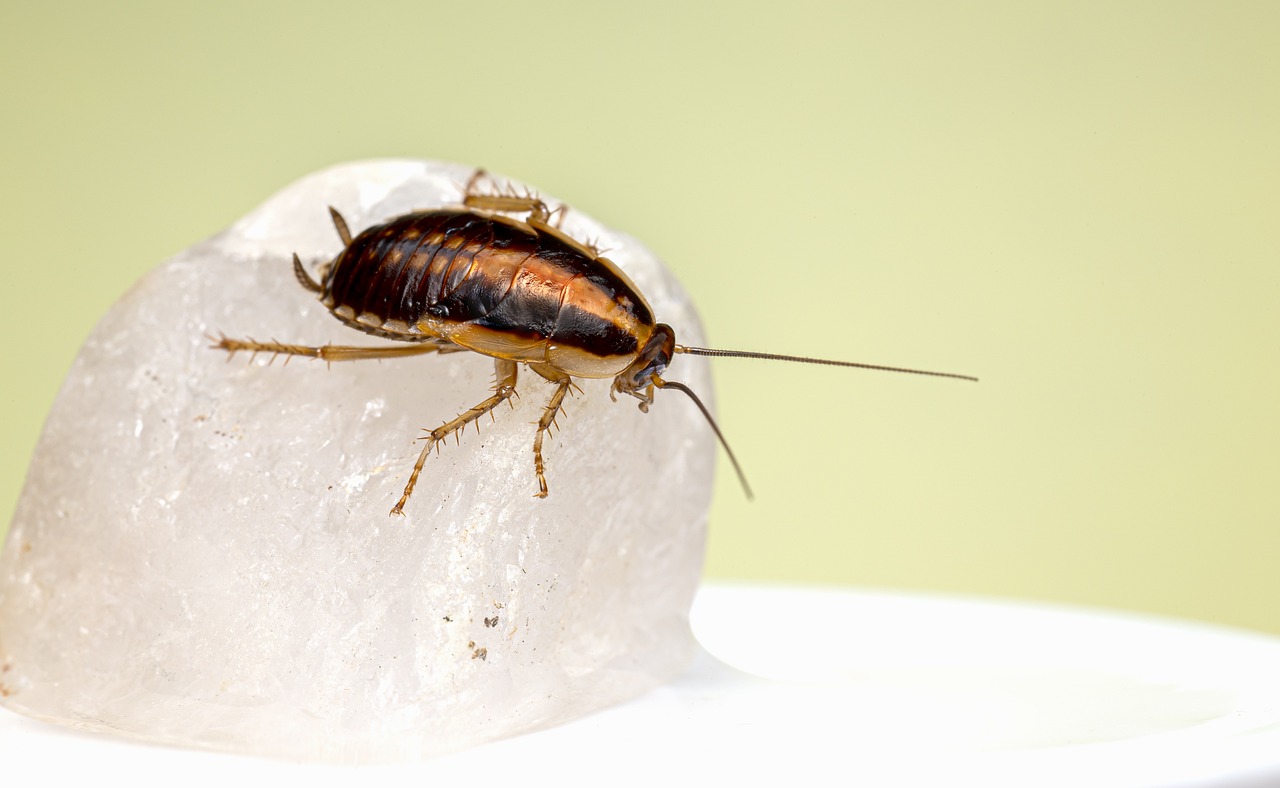
Post-Travel Care
After an adventure filled with new sights and experiences, it’s crucial to focus on , especially when you have pet allergies. The journey might have been enjoyable, but allergens can tag along, and it’s essential to take steps to ensure your home remains a safe haven. First and foremost, take a moment to clean and decontaminate your belongings. This means thoroughly vacuuming your luggage and any items that were exposed to potential allergens, such as clothes and personal items. Allergens like pet dander, dust, and pollen can cling to these surfaces, so a good cleaning can make a significant difference.
Once you’re back home, make it a priority to wash your clothes and any bedding that traveled with you. A hot wash cycle is your best friend here, as it helps eliminate any lingering allergens. If you stayed in pet-friendly accommodations, it’s particularly important to be vigilant, as you never know what might have been left behind by previous guests. In addition to washing, consider using an air purifier in your home for a few days post-travel to help filter out any allergens that may have sneaked in.
Monitoring your health after traveling is equally vital. Pay attention to any lingering symptoms such as sneezing, itchy eyes, or skin irritation. If you notice any of these signs, it might be time to check in with your healthcare provider. They can offer personalized advice, adjust your allergy management plan, or even suggest additional treatments if necessary. Remember, just because you’re home doesn’t mean the battle against allergens is over.
In summary, post-travel care involves a combination of cleaning, monitoring your health, and following up with healthcare professionals if needed. By taking these steps, you can ensure that your home remains a comfortable and safe environment, allowing you to fully enjoy the memories of your travels without the cloud of allergy symptoms hanging over you.
- What should I do if I experience allergy symptoms after traveling? If you notice symptoms, it’s best to consult with a healthcare provider for tailored advice.
- How can I effectively clean my luggage after a trip? Vacuum your luggage thoroughly and wipe down surfaces with a damp cloth. Washing any fabric items is also recommended.
- Are there specific cleaning products that help with allergens? Look for allergen-reducing cleaning products or those labeled as hypoallergenic for the best results.
- How long should I monitor my health after returning home? Keep an eye on your symptoms for at least a week after returning, and consult a doctor if they persist.
Cleaning and Decontamination
After a trip filled with adventures, the last thing you want is to bring home unwanted allergens that could trigger your pet allergies. are crucial steps to ensure a healthy return to your home environment. Think of it like a reset button—you're not just unpacking your bags; you're also safeguarding your space from any lingering allergens that might have hitchhiked back with you.
Start by giving your luggage a thorough clean. Use a damp cloth to wipe down the exterior of your bags, paying special attention to the zippers and seams where allergens can easily hide. If you can, vacuum the inside of your luggage using a vacuum cleaner with a HEPA filter. This will help to trap any pet dander or dust that may have settled during your travels. Remember, even the most careful traveler can unknowingly collect allergens along the way.
Next, consider washing your clothes and any fabric items you brought with you. Use hot water and a hypoallergenic detergent to ensure that any allergens are effectively removed. If you have items that can’t be washed, such as shoes or jackets, give them a good shake outside to dislodge any potential allergens. You might be surprised at how much can accumulate on your belongings during your travels!
To further minimize allergens in your home, it’s wise to clean your living space thoroughly. Here are some key areas to focus on:
- Surfaces: Wipe down surfaces with a damp cloth to remove dust and allergens.
- Floors: Vacuum carpets and rugs, and consider mopping hard floors to eliminate any remaining particles.
- Furniture: Use a lint roller or specialized pet hair remover on upholstery to capture any stray dander.
Finally, don't forget to check your home’s air quality. Running an air purifier with a HEPA filter can significantly reduce airborne allergens. It's like having a personal bodyguard for your lungs! Additionally, consider changing the air filters in your HVAC system to ensure that they are capturing as many allergens as possible.
In summary, cleaning and decontamination after travel is not just a chore—it’s an essential practice for anyone with pet allergies. By taking these steps, you'll create a safer, more comfortable environment for yourself and your furry friends. Remember, your health is worth the extra effort!
Q1: How often should I clean my luggage after traveling with pets?
A1: It's advisable to clean your luggage after every trip, especially if you've traveled with pets, to minimize the risk of bringing allergens into your home.
Q2: What are the best cleaning products for removing pet allergens?
A2: Look for hypoallergenic cleaning products that are specifically designed to remove pet dander and other allergens. Products with natural ingredients are often less irritating and more effective.
Q3: Can I use regular laundry detergent to wash my travel clothes?
A3: While regular detergent can be used, consider using a hypoallergenic detergent to better eliminate allergens and reduce the risk of skin irritation.
Q4: Is it enough to just vacuum my home to remove allergens?
A4: Vacuuming is important, but it should be part of a more comprehensive cleaning strategy that includes wiping surfaces and washing fabrics to effectively reduce allergens.
Follow-Up with Healthcare Providers
After returning from your travels, it’s crucial to schedule a follow-up appointment with your healthcare provider to discuss any allergy symptoms you may have experienced during your trip. This step is often overlooked, but it can be a game-changer in managing your allergies effectively. Your doctor can help assess whether your symptoms were due to specific allergens encountered during your travels or if they indicate a need for a change in your treatment plan.
During this follow-up visit, be prepared to share detailed information about your travel experiences. Consider keeping a journal of your symptoms, noting when they occurred and any potential triggers you encountered. This can provide your healthcare provider with valuable insights into your situation. For instance, if you noticed that your symptoms worsened in certain environments—like a pet-friendly hotel or a family member's house with pets—make sure to mention these specifics.
Additionally, your healthcare provider may recommend adjustments to your allergy management plan. This could include changes in medication, further allergy testing, or even lifestyle modifications to reduce exposure to allergens. It’s essential to keep an open dialogue with your provider, as they can offer tailored advice based on your unique needs and experiences.
Moreover, if you had to use any emergency medications during your travels, such as an epinephrine auto-injector, inform your doctor. They can help you understand whether your current treatment is sufficient or if additional precautions are necessary for future trips. Remember, the goal is not just to survive your travels but to thrive during them!
Lastly, don’t hesitate to ask your healthcare provider any lingering questions or concerns you might have. Here are some common questions you might consider:
- Were my symptoms related to specific allergens?
- Do I need to adjust my allergy medications?
- Should I consider further allergy testing?
- What steps can I take to better prepare for my next trip?
In summary, following up with your healthcare provider is an essential part of managing pet allergies effectively. By taking this proactive approach, you can ensure that you’re well-prepared for your next adventure, equipped with the knowledge and tools to keep your allergies in check.
- What should I do if I experience severe allergic reactions while traveling?
It’s important to seek immediate medical attention and use any prescribed emergency medications, such as an epinephrine auto-injector, if necessary. - How can I find out what allergens I am sensitive to?
Consulting with an allergist for testing can help identify specific allergens that trigger your symptoms. - Are there specific hotels that cater to allergy sufferers?
Yes, many hotels offer hypoallergenic rooms and have strict cleaning protocols to minimize allergens. - What should I pack to manage my allergies while traveling?
Essential items include allergy medications, air purifiers, and hypoallergenic bedding.
Frequently Asked Questions
- What are the common symptoms of pet allergies?
Common symptoms of pet allergies include sneezing, runny or stuffy nose, itchy or watery eyes, and skin rashes. Some individuals may also experience coughing, wheezing, or difficulty breathing. It's essential to recognize these symptoms early to manage them effectively during your travels.
- How can I prepare for pet allergies before traveling?
Preparing for pet allergies involves several steps. Start by consulting with a healthcare professional to discuss your allergies and obtain any necessary prescriptions. Pack essential allergy medications, such as antihistamines and nasal sprays, and research pet-friendly accommodations that minimize allergen exposure.
- What should I pack to manage pet allergies while traveling?
When traveling, it's crucial to pack items that can help manage your allergies. Consider bringing air purifiers, hypoallergenic bedding, and your prescribed medications. Personal care items like wipes and hand sanitizers can also be helpful in reducing allergen exposure during your trip.
- How can I keep my travel environment clean and allergen-free?
To maintain a clean and allergen-free environment while traveling, establish a regular cleaning routine. This can include wiping down surfaces, using protective covers for furniture, and keeping windows closed to prevent allergens from entering. Regularly vacuuming and dusting can also help minimize allergen accumulation.
- What should I do if I experience an allergic reaction while traveling?
If you experience an allergic reaction while traveling, it's important to stay calm and assess your symptoms. Use your prescribed medication, such as an antihistamine or inhaler, if necessary. If symptoms worsen or you have difficulty breathing, seek medical attention immediately.
- How can I clean my belongings after traveling to remove allergens?
After returning home, thoroughly clean your luggage and belongings to remove any allergens you may have encountered during your trip. Wash clothing and bedding in hot water, vacuum your bags, and consider using a lint roller on items that may have collected pet hair or dander.
- Should I follow up with my doctor after traveling?
Yes, it's advisable to schedule a follow-up appointment with your healthcare provider after traveling. Discuss any allergy symptoms you experienced during your trip and evaluate if any adjustments to your management plan are necessary to better handle future travels.

